#GCSE Business studies
Text
A while back ago my business studies teacher took my folder 2 show year 9s what business studies is like n what they teach us here . Which means a bunch of year 9s saw my furry doodles on my papers
2 notes
·
View notes
Text
GCSE Business studies

Phil is one of the best tutors I have ever come across. He is assisting my son with IB business management and not only are his lessons effective and interesting but he also coaches my son as the lesson progresses. I highly recommend Phil. - Lorna, Malta. GCSE Business studies
0 notes
Text
the business exam today be like
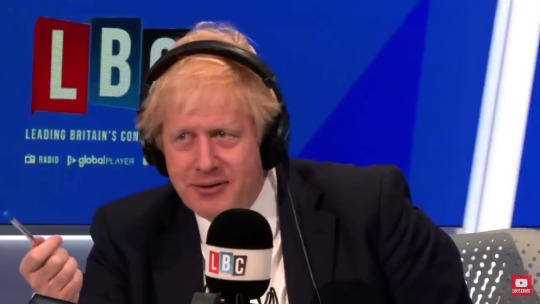
#iykyk#vEEgan sausage rolls#that exam was actually calm#business studies#gcse#gcses 2022#gcse business studies
1 note
·
View note
Text
notice how I suddenly came back from the dead once there's fedal content??
if there's any way to call me, fedal will.
#ive been so busy lately and will he busy for the whole month of october😞😞#i have my gcse's next month guys so its like...revision revision and books and studying non stop for me rn🧍#BUT FEDAL!!#when theres fedal theres me#fedal#story of my life
12 notes
·
View notes
Text
👏little👏is👏better👏than👏nothing👏
#My motto/inspiration#Studying is so hard with mental health issues and i'm busy afterschool a lot of the time and if i dont get enough me time i freak out#Like today i have dofe which is 5:30-7 but i wanted to do some physics revision to catch up from what i missed so i did like 20 minutes#Better than nothing and we did a revision lesson today#wizard rambles.#wizard advice.#study motivation#studyblr#gcse studyblr#high school studyblr#studyspo
1 note
·
View note
Text
back to basics
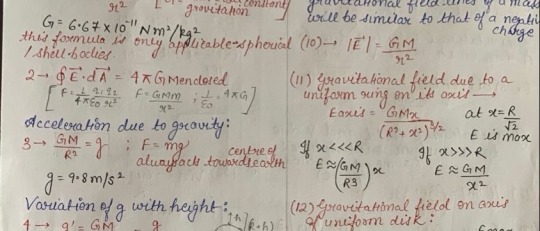
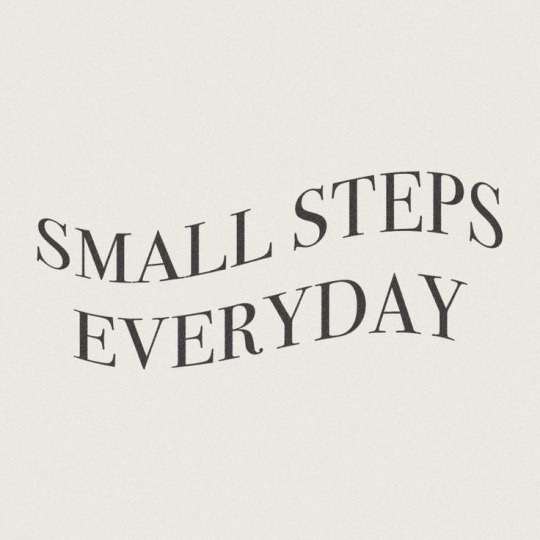
mostly free resources to help you learn the basics that i've gathered for myself so far that i think are cool
everyday
gcfglobal - about the internet, online safety and for kids, life skills like applying for jobs, career planning, resume writing, online learning, today's skills like 3d printing, photoshop, smartphone basics, microsoft office apps, and mac friendly. they have core skills like reading, math, science, language learning - some topics are sparse so hopefully they keep adding things on. great site to start off on learning.
handsonbanking - learn about finances. after highschool, credit, banking, investing, money management, debt, goal setting, loans, cars, small businesses, military, insurance, retirement, etc.
bbc - learning for all ages. primary to adult. arts, history, science, math, reading, english, french, all the way to functional and vocational skills for adults as well, great site!
education.ket - workplace essential skills
general education
mathsgenie - GCSE revision, grade 1-9, math stages 1-14, provides more resources! completely free.
khan academy - pre-k to college, life skills, test prep (sats, mcat, etc), get ready courses, AP, partner courses like NASA, etc. so much more!
aleks - k-12 + higher ed learning program. adapts to each student.
biology4kids - learn biology
cosmos4kids - learn astronomy basics
chem4kids - learn chemistry
physics4kids - learn physics
numbernut - math basics (arithmetic, fractions and decimals, roots and exponents, prealgebra)
education.ket - primary to adult. includes highschool equivalent test prep, the core skills. they have a free resource library and they sell workbooks. they have one on work-life essentials (high demand career sectors + soft skills)
youtube channels
the organic chemistry tutor
khanacademy
crashcourse
tabletclassmath
2minmaths
kevinmathscience
professor leonard
greenemath
mathantics
3blue1brown
literacy
readworks - reading comprehension, build background knowledge, grow your vocabulary, strengthen strategic reading
chompchomp - grammar knowledge
tutors
not the "free resource" part of this post but sometimes we forget we can be tutored especially as an adult. just because we don't have formal education does not mean we can't get 1:1 teaching! please do you research and don't be afraid to try out different tutors. and remember you're not dumb just because someone's teaching style doesn't match up with your learning style.
cambridge coaching - medical school, mba and business, law school, graduate, college academics, high school and college process, middle school and high school admissions
preply - language tutoring. affordable!
revolutionprep - math, science, english, history, computer science (ap, html/css, java, python c++), foreign languages (german, korean, french, italian, spanish, japanese, chinese, esl)
varsity tutors - k-5 subjects, ap, test prep, languages, math, science & engineering, coding, homeschool, college essays, essay editing, etc
chegg - biology, business, engineering/computer science, math, homework help, textbook support, rent and buying books
learn to be - k-12 subjects
for languages
lingq - app. created by steve kaufmann, a polygot (fluent in 20+ languages) an amazing language learning platform that compiles content in 20+ languages like podcasts, graded readers, story times, vlogs, radio, books, the feature to put in your own books! immersion, comprehensible input.
flexiclasses - option to study abroad, resources to learn, mandarin, cantonese, japanese, vietnamese, korean, italian, russian, taiwanese hokkien, shanghainese.
fluentin3months - bootcamp, consultation available, languages: spanish, french, korean, german, chinese, japanese, russian, italian.
fluenz - spanish immersion both online and in person - intensive.
pimsleur - not tutoring** online learning using apps and their method. up to 50 languages, free trial available.
incase time has passed since i last posted this, check on the original post (not the reblogs) to see if i updated link or added new resources. i think i want to add laguage resources at some point too but until then, happy learning!!
#study#education resources#resources#learning#language learning#math#english languages#languages#japanese#mandarin#arabic#italian#computer science#wed design#coding#codeblr#fluency#online learning#learn#digital learning#education#studyinspo#study resources#educate yourselves#self improvement#mathematics#mathblr#resource
358 notes
·
View notes
Text
exam dates for my igcse subjects (gcse for psychology):
may 10: biology paper one
may 13: business paper one
may 15: psychology paper one
may 16: maths paper one
may 17: chemistry paper one
may 22: physics paper one
may 23: english paper one + psychology paper two
june 3: business paper two + maths paper two
june 7: biology paper two
june 11: chemistry paper two
june 14: physics paper two
(color coded based on studying required, guide below the cut)
red: failing, must study urgently
orange: unsteady, studying required
green: okay-ish, will pass if i study sufficiently
purple: got grade 9 in mocks, minimal revision required (will study anyways)
must get all of these to purple before may 10th.
#igcse#studyblr#study blog#study motivation#studying#study aesthetic#studyspo#student#queenie's studies
29 notes
·
View notes
Text
when i want to simplify something to get the point across to as many people as possible i think "would siobhán understand this?"
who's siobhán? well. in school i took economics for 2 years (the equivalent of freshman/sophomore i think but it doesn't really matter). it was the first time my school had offered that class for a GCSE exam. it was also, largely thanks to siobhán, to be the last
see me and a boy called michael were the only people there on purpose. i picked it because it seemed better than the other available options at the time and i was good enough at maths (better than michael, much to his annoyance) . michael was actively interested in economics and those two statements tell you everything you need to know about michael.
the other 4 - because it was only a class of six - were there because everything else was full and they were forced to take it because they had to take something.
this included siobhán.
siobhán, bless her, was not a maths person. siobhán did not understand how to convert fractions into percentages (1/2 = 50%)
every week. for two years, we collectively attempted to explain how to convert between fractions and percentages because you do that quite a bit in economics. it was unfortunately necessary
siobhán never did grasp it
because we spent every week dedicating at least half of the class time to trying to teach siobhán that 1/2 = 50% in a way that would stick, we did not do a whole lot of economics.
which meant that the 4 of them failed. myself and michael ended up with Cs. the lowest grade in any subject for both of us and a blot on our academic record. could have gotten higher if we'd taught ourselves but frankly i didn't give a shit and never studied outside of a class in my life, and michael was too busy obsessively writing and re-writing his maths coursework to get a higher mark than me (he didn't, by the way)
because only 6 people took the class (a fact that already put it on thin ice) and 4 people failed after 'economics' turned into 'remedial maths for siobhán' (a failure rate of 4/6 - that's 67%, siobhán) the whole thing was labelled a catastrophic faiure and they never ran it again.
so we were the first, and also last, class to study economics in my school.
would siobhán understand what you're trying to say
#siobhán didn't pass any of her exams but this was because she got pregnant and happened to be in labour at the time#i don't think she had a lot of time after that to learn maths
153 notes
·
View notes
Text
IGCSE
Heyy everyone
So did CIE's IGCSE and *hair flip* got an A* in all my subjects.
So yeah I'm just tryna help. Fr.
Now listen u dont need to get an A* to be happy with ur grades. If those are ur goals then u go girl. If those are not u still go girl.
But my mum always says "Always aim higher than what u can get. Then you will reach the farthest u can go. Now go make another omelette for me."
Now a major thing I would do before an exam is open a candidate response, the qp, the ms and the examiner report.
Do each question, check with the markscheme, check the candidate response and assess where u are and then the examiner report.
I love this so much: https://paper.sc/
Examiner reports are a really underrated resource and are REALLY HELPFUL.
Use the 'IGCSE' reddit and discord server
IGCSE Notes – Soumya Pandey
Here are some of the resources I used and each subject tips
Maths:
Past papers past papers past pAPERS PAST PAPERS PAST PA-
Girl i cant tell u enough
Also makes sure to learn all the calculator tricks including the linear equations one, differentiation (the only ones I can think off the top of my head)
Make sure to practice past papers have good time management. Calm down during the exam. It'll all be fine.
(trust me i went and got bangs cause i was depressed about the way i wrote the exam and here we are)
Sciences:
Use the examiner report tip. Always always use the syllabus of each subject. And ofc past papers
Skill for Science Packs - Google Drive
Bio:
Drives:
IGCSE Biology (0610) notes from MS - Google Drive
bio
Chem:
Heather Houston - YouTube
IGCSE all chemical tests - YouTube
Drives:
chm
0620 Chemistry – Google Drive
Phy:
physics resources
Business:
Bs is one of the easist subjects cause of the repeated questions and the low thresholds. If there is one subject u wanna chose for fun let it be BS or EVM
EVM:
Smallest syllabus ever
Just do past papers you'll be fine
Ik everyone says that but thats cause its true
The same advice goes to ICT. Like the practicals are the easiest shit u can think of but a big mistake that people do is forget theory.
Study for theory and u get good marks.
English (1st language) :
My fav subject in IGCSE
It was sooo good
Always choose descriptive its just easier to score in
Go read books from good authors like Madelline Miller, Katherine Arden, and Ocean Vuong. Get phrases that u really like and copy them into a word document. Go through it before the exam and use it in the writing
You can also use: https://www.descriptionari.com/
Examiners' Secrets: Descriptive Writing (Mr Salles) - YouTube
Paper 1 video
---------
AND THATS ALL
To everyone doing their GCSE's
All the best
Just remember that it isnt everything. Year 10 and 11 is all about finding urself and having the time of ur life. I sure as hell did. And at the end of the day these results dont matter half as much as u think. Its not that they're not important. Its just that there are more important things in the world.
Go live ur best life before the A level train hits.
44 notes
·
View notes
Text
By: Szu Ping Chan
Published: Mar 31, 2024
Britain has a boy problem. If you are born male today, you are increasingly likely to struggle in school, in the workplace and at home.
The gender attainment gap is not new – girls have been outperforming boys at GCSE level for over three decades now, while the number of women completing degrees has exceeded the number of men since the 1990s.
But solving the problem of underachievement among boys has never been more crucial. Economic growth is stalling, productivity is flatlining and public finances are creaking under the strain of growing benefits bills.
At a time when businesses are struggling to hire, more and more men are dropping out of the workforce. Everyone in society must achieve their fullest potential if we are to fix our economic problems.
There is a political dimension too – William Hague earlier this month raised the alarm about the growing numbers of disaffected young men who, with little offered or promised to them in life, were turning to far-Right politics.
There is nothing innate about boys’ underachievement. There is no fundamental reason why outcomes should be getting worse.
Yet without a concerted effort to close the attainment gap, it seems destined to widen. Ever more men and boys will find themselves unwittingly consigned to life’s scrapheap.
The problem is clear – where are the solutions?
Deepening development gap
Before children even step a foot inside the classroom, boys are already behind.
The Institute for Fiscal Studies (IFS) notes that “a significant gender gap in both cognitive and socio-emotional development” emerges by the age of three.
By the time children start primary school, two-thirds of girls have reached a “good level of development”, suggesting they are able to write a simple sentence or count beyond 20.
Just under two-thirds of boys have hit that same milestone. For children eligible for free school meals, the disparity is even larger.
This gap that opens up at three never completely closes, according to the Institute for Fiscal Studies’ (IFS) analysis of Department for Education data.
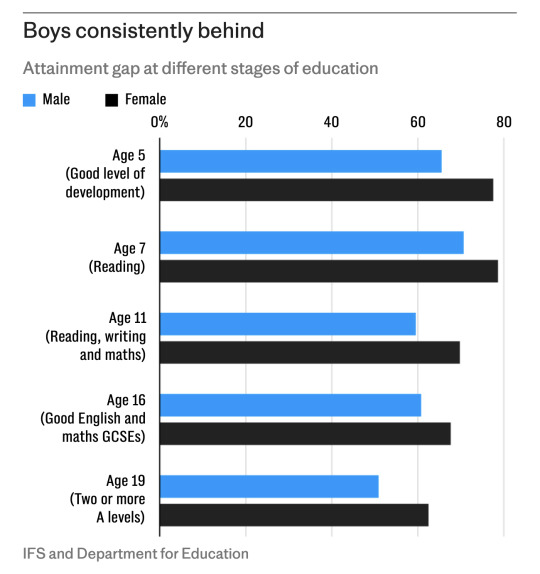
“There’s a silent crisis brewing among boys and men in our classrooms, workplaces and communities,” says Richard Reeves, academic and author of Of Boys and Men, which explores the male malaise from cradle to career.
“Boys now lag behind girls and men lag behind women at almost every level of education. That’s true in nearly every rich economy.”
Reeves, a former adviser to Nick Clegg, the former deputy prime minister, says biology is behind some of this gap.
All the academic evidence suggests that the prefrontal cortex – or in Reeves’s words “the part of the brain that helps you get your act together” – develops around a year or two faster in girls than boys.
Girls are not smarter, they just mature faster, Reeves says. “Anyone who spends any time with teenagers knows exactly what I’m talking about.”
His conclusion is that there are simply some “natural advantages of women and girls in the education system”.
Rather than recognise and compensate for this, the system has in fact evolved in ways that favour girls. A switch to more coursework at GCSE level benefitted girls more than boys, according to the IFS, which noted that the gap in performance first emerged in the 1980s when exam-based O levels were replaced by GCSEs in England, Wales and Northern Ireland.
“The shake-up brought a move towards more continuous assessment, which seems to have benefitted girls,” the IFS said in a recent paper.
This idea is “quite hard to get this across because many people say: well if girls and women always had this natural advantage, why didn’t we see it 40 years ago?” Reeves says. “The answer is sexism.
“There is no doubt my mum would have gone to university if she was born 50 years later, but it wasn’t considered to be a thing. But now having taken the lid off, that potential for women in education just keeps going. There’s nothing wrong with that, it’s just that along the way a lot more men have fallen behind.”
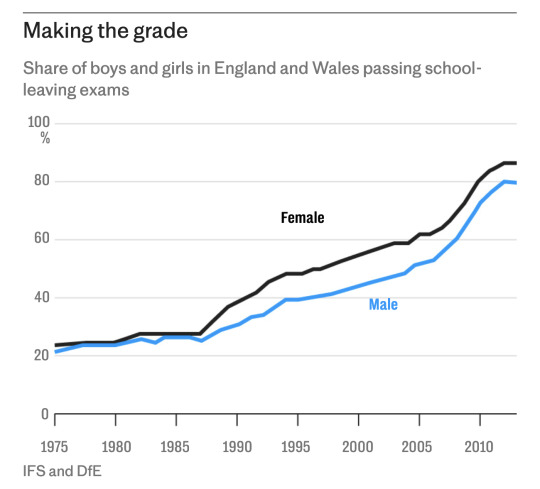
Woes of the white working class
Of course, it would be wrong to suggest women were doing better than men in the working world. A median gender pay gap of 7.7pc still shows women are being shortchanged.
After graduation, men are more likely to get a “highly skilled” job than women and average earnings for a male graduate are around 9pc higher than a female a year after they leave university, according to the IFS.
That gap rises to 31pc a decade later.
However, what is worrying academics, politicians and teachers is that attainment among men and boys seems to be declining while for women it improves.
Average pay adjusted for inflation has fallen by 6.9pc for men since 2008, according to ONS data. Among women, it has climbed 2.2pc. In fact, men’s wages are no higher in real terms today than they were in 2002.
Men have been behind the fall in average hours worked since the pandemic, while women are working more.
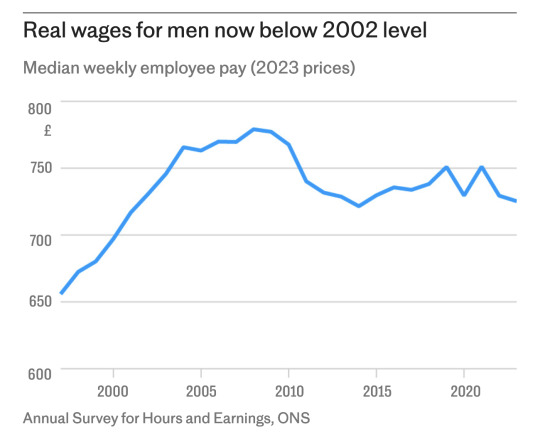
Louise Murphy at the Resolution Foundation says the worsening prospects for boys and men reflect structural factors.
“The industrial structure of the UK has changed. Some of these manufacturing jobs that existed don’t exist in the same way now.”
Reeves says: “It used to be true that men with relatively modest levels of education do OK in the labour market. And that is not always the case anymore.”
The experience of boys in schools has led them to “underperform in the labour market” more broadly, he adds.
Achievement has become a particular issue among one subset of boys in particular: the white working class.
“Too many people in society just see these boys as the people on mopeds with a balaclava on their head,” says Andy Eadie, assistant headteacher at Cardinal Langley school in Rochdale. “Actually, that’s only a tiny minority.”
Eadie has taught at the mixed comprehensive school of 1,200 pupils since 2016. A fifth of his pupils are eligible for free school meals.
Many have already been “written off” by teachers as soon as they enter the classroom, Eadie says, particularly if they are white working class boys.
“There is a perception that some boys are already signed off and have no hope,” he says.
“The danger is that people aren’t bothered about these gaps. They’re just bothered about keeping them quiet so they can get on with other things.”
Just 14.6pc of white working class boys went into higher education in 2021. This was the lowest figure of any ethnic or socio-economic group and a third of the overall average, according to research published by the House of Commons Library.
Eadie says: “A lot of young people in the white working class background actually have really low self-esteem.
“And so you’ve got a lot of young people who potentially all underachieve and not feel very good about themselves.”
There are signs that this malaise is adding to Britain’s worklessness crisis. One in three 18 to 24-year-old boys were classed as economically inactive – meaning they’re not in work or looking for a job – in the three months to January, a record high.
The figure is up by more than five percentage points since the end of 2019, before the pandemic. Inactivity among 50 to 64-year-old men has climbed five times slower over the same period.
The inactivity rate among young men has roughly doubled since the early 90s, with almost two million now out of the labour force.
Some are choosing to stay on in education but the share of men not in employment, education or training (NEET) is climbing back towards financial crisis rates at 15.3pc. For women, it has remained on a bumpy but downward path.
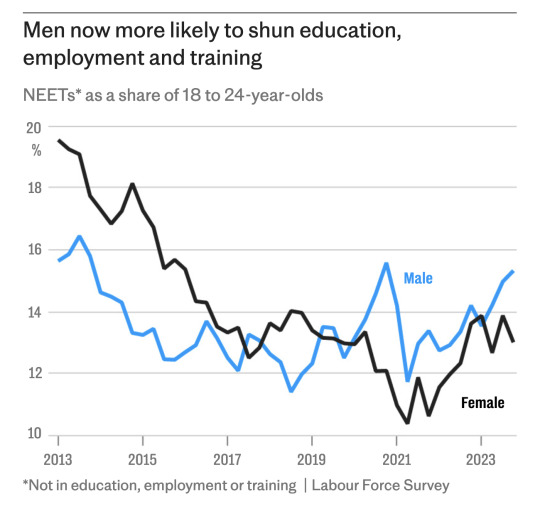
“I think it goes back to the idea that we just don’t expect our boys to do well. So they don’t do well,” says Conservative MP Nick Fletcher, who leads the All-Party Parliamentary Group (APPG) for men and boys.
Caroline Barlow, headteacher at Heathfield Community College, has submitted evidence to the APPG suggesting there was a culture of low expectations for male students.
“In the early days, there was a tendency to almost just be grateful if boys were there and they were doing some work,” she said.
By shifting teachers’ expectations of their pupils, results improved and Heathfield was also able to close the gender gap.
Fletcher says: “We expect our boys to behave badly, so they behave badly. We are letting our boys down and unless we actually recognise we have a problem, then we won’t really start searching for the solution.”
Where does the problem start? Some think it is in the home.
Family circumstances have changed dramatically over the past few decades, with a sharp rise in lone parent households as divorce becomes more common or people don’t even get married in the first place. The vast majority of children in these circumstances grow up with their mothers.
In part, this reflects the economic empowerment of women: they can afford to be a single parent.
However, it raises the question of where male role models are coming from. Research conducted jointly by the Fatherhood Institute found that fathers who read to their children every day are contributing to their development and can help to address early attainment gaps.
The Conservative peer Lord Willetts writes in his book, The Pinch: “A welfare system that was originally designed to compensate men for loss of earnings is slowly and messily redesigned to compensate women for the loss of men.”
This too can leave men rudderless in mid-life.
As Reeves puts it in his book: “Economically independent women can now flourish whether they are wives or not. Wifeless men, by contrast, are often a mess. Compared to married men, their health is worse, their employment rates are lower, and their social networks are weaker.”

‘Crisis in masculinity’
The underachievement of men and boys was once seen as almost taboo.
“There have been people who have sniggered when I stood up and asked for a minister for men and a men’s health strategy,” says Fletcher.
“I genuinely believe some of the problems we face are down to the lack of interest in young boys and men, who we’ve always assumed are going to be fine.”
However, politicians have now started to notice.
Wes Streeting, the shadow health secretary, has announced that Labour is looking at introducing a men’s health strategy to address what he describes as a “crisis in masculinity” that is costing lives.
It is understood that Labour’s forthcoming review into mental health by Luciana Berger will include a chapter that focuses on male suicide. It remains the biggest killer of British men aged under 35.
William Hague, the former Tory leader, believes the issue is reshaping politics. He recently highlighted that a majority of men now believe they are being discriminated against, which is fuelling support among young men for extreme parties.
Fletcher is calling for a dedicated minister for men to match the minister for women, Kemi Badenoch, who is also part of the Cabinet as Business Secretary.
Despite overwhelming evidence that boys are falling behind, some colleagues still treat the idea of a dedicated minister with ridicule.
Fletcher says: “I think one of the problems that we’ve had as a society is there’s a lot of reluctance to speak up for men. We’ve noticed it in parliament over the years.”
Reeves wants to challenge the longstanding assumption that gender gaps only run one way.
He takes particular issue with the World Economic Forum (WEF), which looks at progress on gender equality across the world.
Countries are scored on a scale from zero to one, with the former representing no equality and the latter signalling full equality. The problem, says Reeves, is that the index itself assumes that only women have any catching up to do.
For example, it “assigns the same score to a country that has reached parity between women and men and one where women have surpassed men”.
This is a deliberate choice. However, as a result the UK’s educational attainment score stands at 0.999 despite the fact that girls have clearly outperformed boys for decades.
Reeves believes continuing to publish the index in this way is damaging and leads “to a lack of policy attention to the problems of boys and men”. In short, he says: “It makes no sense to treat gender inequality as a one-way street.”
The Government insists it is making progress, with a Department for Education spokesman saying the gender gap “across most headline measures is narrowing across all key phases.
“Education standards have risen sharply across the country, with 90pc of schools now rated good or outstanding by Ofsted, up from just 68pc in 2010.”
Reeves offers some radical solutions to closing the attainment gap in his book, including starting boys a year later in school. Many teachers and academics believe this is not practical and Reeves himself says the idea was designed to spark a debate.
Reeves says the evidence also suggests children should take more frequent breaks at school because boys find it harder than girls to sit still. He himself was put in a special class for English because his teachers felt he lacked focus.
At Balcarras secondary school in Cheltenham, headteacher Dominic Burke felt the only way to tackle what used to be a 15pc gender gap in the GCSE results was to level with his students.
“We got the boys together en masse and said to them: ‘You’re going to underachieve. The girls are going to beat you hands down’. And then we showed them the evidence. Their ability profiles were the same. But we said the reality is girls are going to get better results than you and we challenge you to be the first year group to stop that. We called it the ‘effort challenge’.”
It worked. Competition and the offer of cold, hard cash was enough to encourage many to put the effort in. Boys who were judged to have done so received £20 at the end of term. The school managed to close the gender gap and a few years ago, the boys beat the girls for the first time.
“Competition does work I think, and it’s a good tactic for teaching because it becomes a rewarding experience to meet the challenge,” says Burke. “If you make something more engaging and enjoyable, people are more likely to do it.”
Healing
No survey of the state of boys and men in Britain today can ignore the changing ideas of masculinity.
Whereas men were once seen as breadwinners, American sociologists Kathryn Edin and Maria Kefalas point out that many women in poor US neighbourhoods have come to see them “as just another mouth to feed”. This is disorientating.
Yet perhaps the way to survive as a man in the job market of the future is to junk ideas of traditional masculinity altogether. Many of the jobs of the future will be in things like caring and education.
Reeves wants governments to spearhead a drive to get more men into health, education, administration, and literacy jobs – which he brands HEAL – just as they have ploughed efforts into getting more women into science, technology, engineering, and mathematics – or STEM roles.
Increasing the number of male teachers would also raise the number of role models for boys in class. Three-quarters of state school teachers are women, according to data published by the Department for Education.
The share of men working in state-funded nurseries is even lower, at just 14pc. Around 30pc of primary schools have no male teachers at all.
“I did actually get some funny looks when I first started,” says one male nursery worker who does not wish to be identified.
“Even now I tend to leave the cuddles to my female colleagues as I think there’s still a stereotype that any man who wants to work with young kids has to be some kind of pervert.”
Encouraging more men into these types of jobs would be no small undertaking. Perceptions that men are not suited to caring or creative professions are deep-seated.
Florence Nightingale, who in the 19th century established the principles of modern nursing, insisted that men’s “hard and horny” hands were “not fitted to touch, bathe and dress wounded limbs, however gentle their hearts may be”. The Royal College of Nursing did not even admit men as members until 1960.
Edward Davies, policy director at the Centre for Social Justice think tank, cautions: “It’s absolutely right to remove cultural, perceived and real barriers that keep men from certain careers, especially caring and teaching professions. But we also need to be careful not to pretend men and women are exactly the same.
“At a blunt population level women seem more interested in people and men in things. You would expect to see that reality play out in the jobs they do too. Imposing quotas or expectations that all professions should be evenly split between men and women will probably drive some people into careers they are not suited to.”
Fixing Britain’s boy problem may be harder than even experts think.
[ Via: https://archive.today/AFaiR ]
==
The people who talk endlessly about "equality" and "equal rights" are strangely silent when it comes to areas where boys and men fall behind: education, health and lifespan, and life satisfaction.
https://journals.plos.org/plosone/article?id=10.1371/journal.pone.0205349

[ The Basic Index of Gender Inequality (BIGI, x-axis) as a function of the Human Development Index (HDI, y-axis).
BIGI is the average of 3 components: Ratio in healthy life span, ratio in overall life satisfaction, and ratio in educational opportunities during childhood (see Materials and Methods for details). Deviation from zero implies the extent of gender inequality. The plot shows the largest contributor to the overall score for each nation: Purple dots indicate healthy life span is the most important component, green dots indicate educational opportunities, and red dots indicate overall life satisfaction. The Ns indicate for each level of HDI how many nations have a BIGI score greater than 0, and how many less than 0. ]
Almost like it isn't "just about equality."
14 notes
·
View notes
Text
not been very active recently because ive been so busy studying.
it’s so difficult trying to distract myself from getting skinny to do my gcses :(
#@n@ diary#@nor3×14#@na shit#@na motivation#@nor3xia#@na vent#@tw edd#tw ed but not sheeran#trans ana#ana male#pro for me not for thee#⭐️ ing motivation#⭐️vation goals#⭐️rving#⭐️ve
8 notes
·
View notes
Text
Business studies test tmr, wish me luck!! :3 (I need it I haven't study at all)
6 notes
·
View notes
Text
GCSE Business studies

Phil is one of the best tutors I have ever come across. He is assisting my son with IB business management and not only are his lessons effective and interesting but he also coaches my son as the lesson progresses. I highly recommend Phil. - Lorna, Malta. GCSE Business studies
0 notes
Text
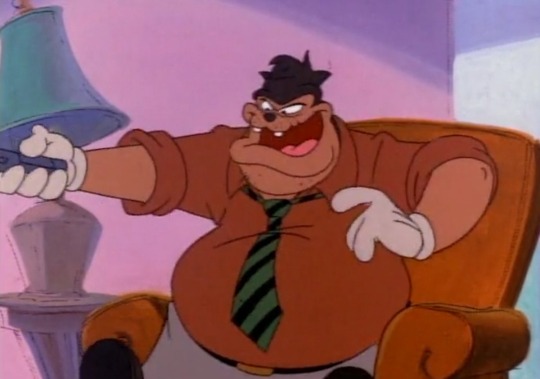
i know hed fail his english gcses.... hang on
gcses hed pick
business studies
history
gcse pe
design and technology
hed be in bottom set everything for core subjects. he doesnt care at all. j think hed be good at all of his chosen subjects though and hed pass science and maths with a 5 and a 4 respectively
after gcses hed do an apprenticeship or something..... my ideas for goof troop pete if he was british and went to secondary school☝️
#txt#this applies to most versions of him#vut not all petes are created equally. 3 mouseketeers pete for example. hed definitely pass english. and hed pick french instead of dt#pete
7 notes
·
View notes
Note
what gcses do you think the ark took?
very important information i need to know
all of them took music. easy passes for them, yaknow? they need something simple like that so they can manage band life at the same time.
jimmy probably took all humanities otherwise, so like history/geography/RPE (religion, philosophy & ethics, this was an option in my school idk if its slightly differsnt in other schools but u get what i mean.) im leaning more towards history and RPE. i feel like hes good at debate, more because he feels like he has to be over than enjoying it all that much. bitch learns about topics he doesnt care for out of spite. with his anxiety, he still prefers written essays though.
for some reason i can see rowan being very good with your classic academics like maths and science. id say he took triple science and some kind of business studies.
lister took history, only because jimmy was taking it, and art because he thought it would be easy (it wasn't.) he only passed music and english literature, which he scrapped a C in, but ended up settling for it. rowan passed his exams with A*/A somehow, lister thinks hes just naturally good but he put a lot of effort into that, probably got sick with stress as soon as exams were over. jimmy passed most of his exams but failed science.
you didn't ask but im doing the girls too;
bliss also took art because she thought it would be easy, history and geography. (these were literally my gcses but technically i did photography)
angel also seems like an arty gal. going to say she did art too, as well as compsci. for some resson i can see her doing some sort of language? im not sure why. something like french or german, because she wasn't sure what else to take. these are purposely all over the place because she had no idea what she wanted to do. she someone got into psychologh a-level at the end of it instead. she keeps it real.
juliet was definitely pushed to take classes she hated by her parents. business, law, triple science. all that shit that they say will set you up for a successful future. she gets through them at the cost of throwing away her sanity for academic validation. she passed with mostly A/A* and one or two B's, which she was proud of until her parents compared her to her friends or classmates who did better. (i love juliet angst shes sooooo i love her so so much)
ALSO JADE OMONDI. def took compsci, probably business too, and some sort of creative, like photography over music id say. also not related but i feel she took things like violin or piano lessons through school too.
#lister bird#rowan omondi#jimmy kaga ricci#juliet schwartz#angel rahimi#bliss lai#i was born for this#iwbft#alice oseman#osemanverse
44 notes
·
View notes
Text
the crows but theyre in secondary school (not sixth form !!)
*nina writes in pink pen despite every single teacher repeatedly telling her not to
* jesper uses both blue and black depending on how much he likes the lesson (blue: good black: bad)
* inej and wylan write in blue
* kaz and matthias write in black
* matthias uses those bic pens with the four colours because they’re practical (but only the blue ones)
* inej gets away with wearing boots even though they’re strictly against school uniform rules
* nina and jesper took the shoulder pads out of their blazers because they hated the blockiness of them
* jesper always has food in his pockets and nina always asks for some
* matthias always has mint imperials on him at all time
* wylan is close with all the science teachers
* he also performs in school assemblies (not by choice)
* inej steals food from the canteen for the students who cant afford any #vigilante shit
* kaz almost ran for head boy just for the power he would have
* nina got head girl but she only ran because zoya was head girl when she was in year 11 and wanted to make her proud
* jesper never has a bag or a pencil case and basically just shoves everything into his blazer pockets
* wylan has a brown canvas messenger bag that he would get terrored for until year 9 and then everyone was jealous of how much he could carry around without looking like a dickhead
* matthias has a plain black backpack because he made the mistake of having a white one in year 7 and everyone drew on it
* inej has a purple kanken backpack and especially loves it for its little seat pad
* nina has an array of tote bags that she rotates through - they’re impractical and hurt her shoulder but she doesn’t care
* kaz also just has a plain black backpack but its almost always empty cos he just keeps most his stuff in his locker, that way no one can just take his stuff
* nina lives with zoya and genya and co in a foster home #orphan
* kaz lives with jesper and colm and has done since his parents died when they were in primary school (they’ve known each other since foundation)
* inej wylan and matthias all live at home as well
* wylan and his dad shockingly have a terrible relationship so wylan spends a lot of time at jespers
* matthias loves his parents but has grown to disagree with their beliefs since moving to the area in year 7 and he doesn’t know how they’d react to learning he no longer saw their views as correct
* inej loves her parents with her whole entire heart and would do anything for them
* the designated house they go to is normally jesper and kaz’s or inej’s
* wylan is a stem student through and through but he’s best at chemistry
* he also is brilliant at music but actively avoids a certain piano player
* nina is the best language student in the school and she unusually takes both spanish and french whilst also learning german and italian in her own time
* matthias is best at geography and history (he took both) and loves learning about the world
* inej also took geography but she adores re and loves learning about other cultures
* jesper took media studies and art for gcse and it was the best decision hes ever made
* kaz thrives in english and business studies but especially english literature as he has a hidden passion for poems
* they all (even kaz despite him saying otherwise) love pe because they were all put in the same class so its just them fucking around and competing with each other
* inej always has an umbrella
* nina and jesper never bring a coat in even when they know they should and get soaked walking home in the rain
* inej and matthias walk to and from school together as they live on the same road and they get hot chocolate from the costa in the sainsburys every monday morning
* kaz jesper nina and wylan all walk together
* jesper and kaz are closest to the school whereas nina and wylan have to keep going
*wylan then walks one way for another ten while nina walks the other for another twenty
* inej always makes nina take her umbrella
* inej got nina an umbrella for christmas
* they do secret santa every year but they all end up getting everyone something anyway
* nina and matthias both had crushes on each other in year 9 but didnt admit it until year 11
* jesper and wylan got together in year 10 after wylan was made to perform in the christmas show playing his flute
* kaz and inej never had to admit their feelings for each other just one day something changed between them and they rarely acknowledge it
* they sit the art room for lunch when its cold or on a picnic bench when it’s sunny
* kaz sells radnor fizz to students after they got rid of them from the canteen and makes loads of money from them
* inej and jesper are the best dodgeball players
* inej is best at dodging but jesper is best at throwing
* nina just screams a lot
* matthias is on the rugby team and they watch all his games
* he also despises football and gets angry whenever its on the tv
* nina is on the netball team
* the netball team and rugby team have a weird rivalry and they used to hate each other
* kaz writes all of jespers essays for money
* jesper writes all of wylans essays but wylan tells him exactly what to write
* theyre in a book club
* they are the book club
* its how they all met
* wylan used audiobooks and kaz gets him free audiobooks some how
* they were friends with each other before the book club but not as one big group
* eg. inej and nina / inej kaz and jesper / wylan and kaz / jesper and nina / matthias and inej / nina and wylan / wylan and matthias
* the first book they read in book club was the raven boys 💖💖💖💖💖💖
#six of crows#nina zenik#kaz brekker#inej ghafa#wylan van eck#wylan hendriks#wylan van sunshine#jesper fahey#jesper llewellyn fahey#matthias helvar#headcanon#au#secondary school#ENGLAND 🏴🏴🏴🏴🏴🏴#shadow and bone#shadow and bone season 2#gotcha#zoya nazyanelsky#genya safin#found family#💖💖💖💖💖💖#helnik#kanej#wesper
83 notes
·
View notes